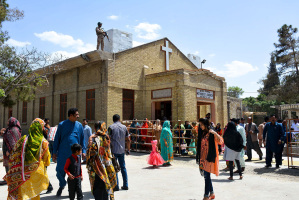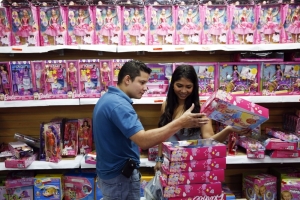World Population Now 7 Billion: Is it Too High?
The world's 7th billion baby was possibly born today, according to the United Nations (U.N.), and several babies are being recognized as the (7th billion) one. But despite the festivities, some doctors and environmentalists are wondering if the earth can handle such a high number of people.
There is no possible way to determine which baby is the 7th billion, but the U.N. Population Division designated Oct. 31 as "Seven Billion Day," the day when the mark would be hit, and picked several babies born Oct. 31 to be symbols of the milestone.
In the Philippines, Danica May Camacho, a 5-pound girl born one month premature, was the first to be credited as one of the official 7th billion babies by the U.N., according to The Associated Press.
"She looks so lovely," her mother, Camille Dalura, said. "I can't believe she is the world's seven billionth."
In addition, Plan India, a child rights organization, has claimed that Nargis, a 6.6-pound girl is the "symbolic" 7th billion baby, according to The Times of India.
Nargis' father, Ajay, a farmer, said, "We are very happy with the birth of our daughter. My wife and I have only managed to study till class X. However, we will ensure that Nargis studies well and does well in life."
All of the babies picked to be symbolic 7th billion babies will be given special recognition. The Times of India reported that Nargis was given a formal ceremony commemorating the milestone.
Despite the festivities, the new mark has given pause to some.
"Seven billion is a number we should think about deeply," said Dr. Eric Tayag of the Philippines' Department of Health, according to the AP.
"We should really focus on the question of whether there will be food, clean water, shelter, education and a decent life for every child," he said. "If the answer is 'no,' it would be better for people to look at easing this population explosion."
Indeed, Danica's mother, who is Catholic, said she will begin to use birth control despite the Roman Catholic Church's opposition to contraception.
"The number of homeless children I see on the streets keeps multiplying," Camacho said. "When I see them, I'm bothered because I eat and maybe they don't."
The new mark has also brought the controversial topic of abortion into the discussion.
The leader of the U.N. Population Fund, Dr. Babatunde Osotimehin, a Nigerian obstetrician-gynecologist, whose agency has come under criticism from anti-abortion activists for developing family planning clinics in poor countries, said that continuing advances in family planning is crucial, according to the Los Angeles Times.
"In many parts of the developing world, where population growth is outpacing economic growth, the need for reproductive health services, especially family planning, remains great," Osotimehin wrote in the annual State of the World Population report.
Some environmentalists have also questioned whether or not the earth can sustain the rising human population. According to Wired, every human in the world combines for .00018 percent of Earth's "non-marine biomass," but humans use 20 percent of the earth's resources - with approximately one fifth of the population living in poverty and without access to many of earth's resources.
If living standards for each person around the world were brought up to American standards, humans would ned five earth's to handle the demand, according to the Independent.
The UN estimates that the world population will hit 8 billion in 2024.




























